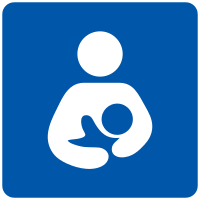
Photo from wikipedia
ABSTRACT This study examined the demographic and sociocultural influences on the level of exclusive breastfeeding (EBF) practices in Enugu state. The major instrument for data collection was a uniform set… Click to show full abstract
ABSTRACT This study examined the demographic and sociocultural influences on the level of exclusive breastfeeding (EBF) practices in Enugu state. The major instrument for data collection was a uniform set of structured questionnaire and in-depth interviews with the husbands, grandmothers/mothers-in-law, health workers, women leaders, and traditional/community leaders. Data were analyzed using frequencies, percentages and chi-squared test. Qualitative data were analyzed with ATLAS.ti. The study established that the prevalence level of EBF practice was relatively low (27%) in all the local government areas in the state. The result also showed that several sociocultural factors affected EBF practice. Some of them were: influence of TBAs (91%); poor nutrition in family menu (82%); campaign/marketing of artificial feed (78.3%), unfavorable conditions in the work place (66.8%); belief that lack of water can kill a baby (64.6%) and influence of grandmothers/mothers-in-law (64.2%). The results further revealed that age, occupation, parity, and educational qualification of the mothers influences the level of EBF practice. The findings also revealed that majority of mothers practice mixed feeding in the name of EBF practice. It is suggested that more efforts are needed in giving proper and adequate education and skilled counseling on EBF practice and sociocultural factors associated with the practice.
Journal Title: Social Work in Public Health
Year Published: 2022
Link to full text (if available)
Share on Social Media: Sign Up to like & get
recommendations!